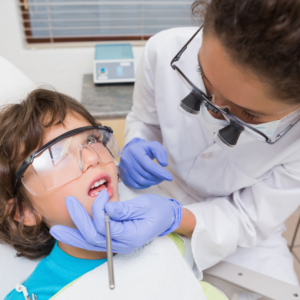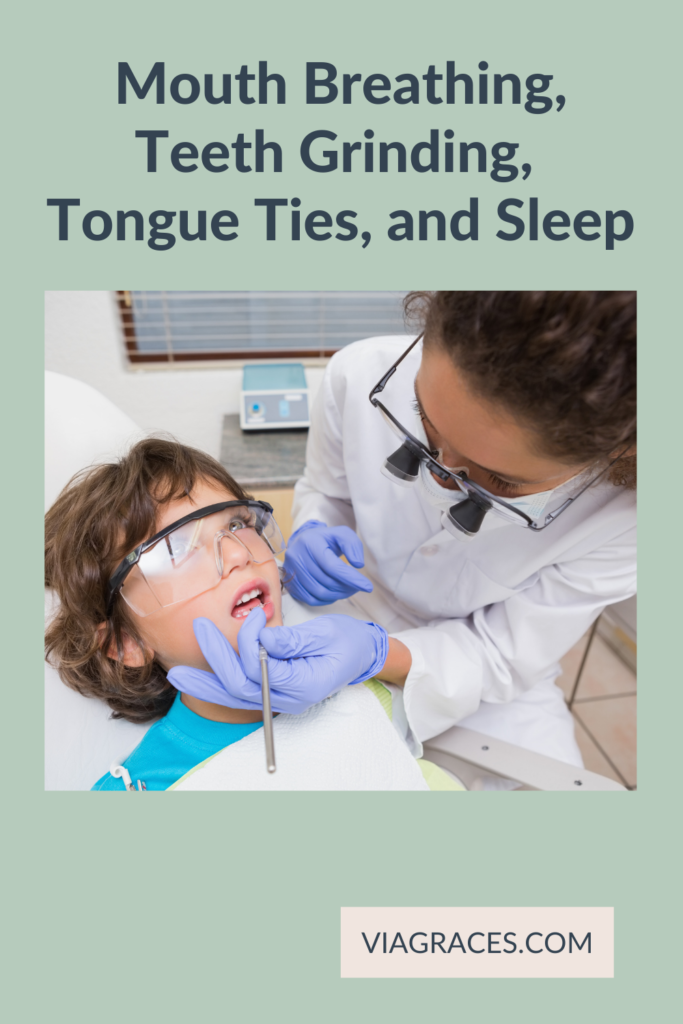When I work with families, I help them adjust schedules, routines, and environments, and we walk through a plan that will teach their little one to fall asleep independently; we work on making behavioral and environmental changes that lead to success!
And for most families, this is exactly what they need to solve their child’s exhausting sleep habits.
I also know, however, that there are challenges that go beyond what I can help with, such as mouth breathing, teeth grinding, and lip and tongue ties, and more, and those can be significant challenges that affect young kids (and adults!).
So if a family comes to me and in diving deeper I learn that their child is a mouth breather, for example, I often recommend they first speak to their pediatrician or pediatric dentist before we work together to make sure everything has been checked out and we have the okay to get started.
Because if we’re going to jump in we want it to WORK!
To help us better understand these challenges and how they could affect our kids and their sleep, I’ve asked Dr. Jonelle Anamelechi, of Children’s Choice Dentistry, to join me in answering some questions.

How might mouth breathing affect a child’s (or adult’s) sleep? What’s going on there? And what should a parent do if their child is a mouth breather?
Mouth breathing = lips separated while breathing, awake or asleep
Mouth breathing indicates an issue of which the body is having to compensate positioning in order to breathe clearly. It indicates a growth and development issue and it is our duty to figure out where in growth and development this issue happened and how to best correct it, as the direction of growth and development of the jaws is also influenced by the position of the mouth.
Mouth breathing is a secondary effect of allergies, enlarged tonsils, blockages of sinuses, nose congestion from infection, or sleep apnea.
If a parent notices their child is a mouth breather, discuss this with your pediatrician and pediatric dentist.
Why do some kids grind their teeth at night? Is there anything we can do to help minimize the teeth grinding?
Grinding = tooth to tooth rubbing, aside from eating, potentially contributing to tooth wear
Grinding is also a secondary issue of growth and development. A child may have several reasons why they grind but they tend to fall into two categories:
- Neurological
- Respiratory
Regardless of the reason, unfortunately, night guards cannot be made for growing children as growth mainly happens at night. Therefore it is crucial to try to figure out why the grinding may be happening.
It may be a new sleep preparation/sleep habits that can help, or meeting with a medical professional to see if there are neurological or respiratory reasons (like sleep apnea) for why the child is grinding their teeth.
Tooth grinding, especially into adulthood, can have severe effects on oral development, growth, and stability.
Talk to us about lip and tongue ties. What are signs a child has one? Can toddlers and older kids have lip or tongue ties? What might those restrictions affect?
Lip and Tongue Ties = restrictions in the movement of the lips and tongue due to an attachment, called a frenum
Lip and tongue ties are also something that are growth and development related, as they happen as the head and neck are formed. Frequently a child who has a lip and tongue tie that affects feeding is identified very early in life due to failure to thrive, inefficiency in feeding, maternal discomfort while breastfeeding, or increased gastric reflux.
Because this is a restriction of the lip and/or tongue, as our little ones grow, speech, breathing, and graduated feeding can also be affected as abnormal movement or position of the lips and tongue affect the mouth’s overall development.
A child may not pronounce certain words correctly because it depends on the tongue to position itself in the right way in the mouth to say those words.
Additionally, a child may have an abnormal swallowing pattern because the lips may not come together or the tongue may not be able to move the food within the mouth to swallow without gagging.
Every part of the mouth works together in its very own way!
How do ALL of these relate to sleep?
If any of these issues are identified, they can be related to possible pediatric sleep disordered breathing.
What is sleep disordered breathing?
Sleep disordered breathing represents a group of conditions that are characterized by an abnormal respiratory pattern during sleep that can be isolated or coexist with other respiratory, nervous, cardiovascular, or endocrine diseases.
What to do?
Speak with your sleep therapist to determine next steps and the connection to their team of experts to dig deeper. A team may include but is not limited to ENTs, Pediatricians, Oromyofacial Therapists, Speech and Language Pathologists, and Sleep Therapists.
ABOUT THE AUTHOR

Dr. Jonelle Anamelechi is: Wife. Mother. Daughter. Sister. Aunt. Washington, DC Board Certified Pediatric Dentist. Entrepreneur. Creative. Visionary.. Philanthropist. Yogi. Girl Boss.. Eternal Optimist..
Dr. Anamelechi has been practicing for 14 years. She grew up in Rembert , SC and attended Duke University for her undergraduate degree in Cultural Anthropology and Chemistry. She started her own path in dentistry at the University of North Carolina at Chapel Hill (UNC–CH) Adams School of Dentistry and completed her Masters of Public Health in Maternal and Child Health at the UNC–CH School of Global Health. Dr. Anamelechi attended St. Joseph Regional Medical Center (Patterson, NJ) for her pediatric dental residency program. She opened Children‘s Choice Pediatric Dentistry and Orthodontics in New Carrollton, MD (2014) and Washington, DC (2019) completely from scratch and built the practice of her dreams. At Children‘s Choice, Dr. Anamelechi has created an engaging atmosphere treating her patients and parents to white–glove service that she has become known for. She is attending faculty at Children‘s National Hospital (Washington, DC) in the Division of Oral Health, Medstar Georgetown Hospital (Washington, DC) in the Department of Pediatric Medicine, and Guest Faculty at Georgetown School of Law. She is also the creator behind all of Children‘s Choice‘s social media and marketing.
As co–editor, she is launching a book called “What Should Mommy Do? For Their Child‘s Oral Health” being released Spring, 2021.
